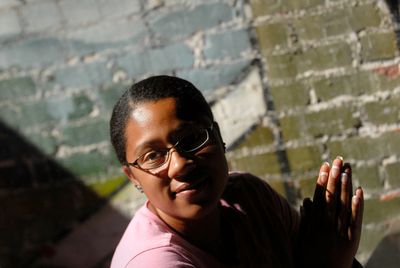Francell Daubert

Francell Daubert’s grandfather found opportunity in Spokane.
Along with other black people who came to the Inland Northwest from the pre-civil-rights-era South, Elmo Dalbert and his partner, Jim Chase, ran a successful business and became part of a generation of prominent civil-rights figures in Spokane during an era of expanding prospects and social change. Chase eventually became Spokane’s first and only black mayor.
But many of the children of that generation left to find their opportunities elsewhere, in places where black people and black culture were not so rare. Daubert ticked off some of the departures in a recent interview.
“My dad went to California,” she said. “Roland (Chase) went down to Portland and other places for his photography. Mona Lake-Jones moved to Seattle. Tina Rose went down to L.A. … They were looking for a community that had more people like them.
“I think it was not necessarily race relations that made them want to move, but it was the size of the community,” she said.
That tension has been a part of Spokane’s history for decades, and the growth in the city’s black population has been slow. In 2007 Census estimates, Spokane County’s black population was 1.8 percent. In Kootenai County, it was 0.5 percent.
Daubert, 30, grew up spending part of each year in Oakland and part in Spokane. She graduated from Shadle Park High and, this spring, from Gonzaga University. As part of her schoolwork, she researched the histories of four prominent Spokane families – the Dalberts, Chases, Freemans and Lakes.
She said she’s always considered Spokane in terms of contradictions – a place where limitations and opportunities live side by side. For her grandfather’s generation, Spokane was certainly no zone of pure tolerance, but it was a place without a recent history of slavery or formal segregation, a place with more freedom and opportunity than a lot of others. “I’ve wanted to make a documentary to show to the younger folks, to show that Chase is not just a middle school, he’s a man who came from picking cotton in Texas, riding the rails here for free and making it to the highest office, at least in this city, as mayor,” she said. “That there are really good success stories here, that Spokane has always been a place where blacks could thrive.”
At the same time, she said, racism has sometimes thrived here as well, and not just among those who wore swastikas and held parades in North Idaho.
Which brings us to Daubert’s own generation and the ones to come. The black community is growing, despite its relatively small size, she said. The town is larger and more welcoming than in the past. A mother of a 4-year-old, she says she may stay in Spokane or may not; it depends on where she finds a job.
“Spokane, I see it as a diamond in the rough,” she said. “A lot of my black friends have moved because they didn’t believe that the opportunity was here. But in general and overall, I think the community is opening up.”